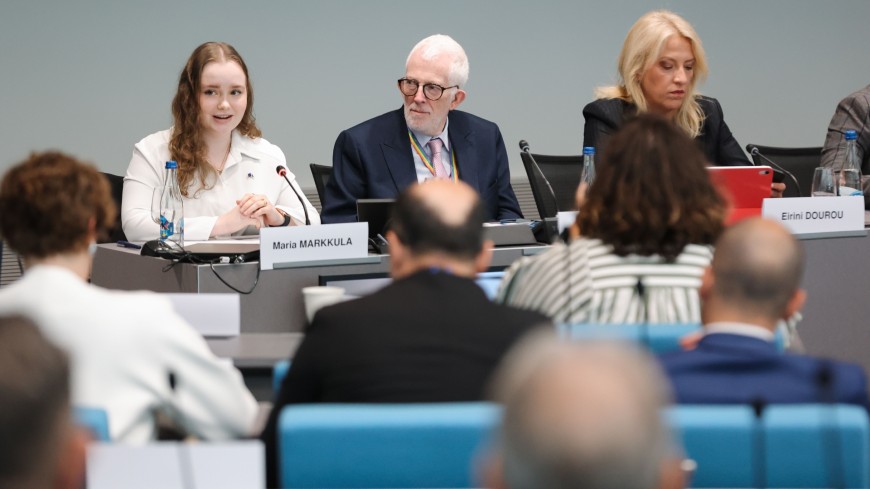Making local and regional democracy more inclusive means first and foremost increasing the proportion of women among elected representatives, but also opening up assemblies to young people and allowing groups such as people with disabilities, the elderly and migrants to make their voices heard and express themselves. The second round table of the Conference, on citizen participation in local and regional political life, highlighted a number of cases where efforts had been made to achieve these goals.
Long reserved exclusively for men, the right to vote had been expanded to include women, thereby making elected officials more representative. Bryony Rudkin, Chair of the Congress Committee on Social Inclusion and Human Dignity and councillor at Ipswich Borough Council (UK), believed that the same should be done with other groups that were under-represented or poorly represented in assemblies. In her view, increasing diversity in this way would also help to stem democratic backsliding and reduce political polarisation.
A member of the Greek Parliament, Eirini Dourou had served in the Congress for many years. She was outraged by the sexism and gender-based violence that still went on in political life, and pointed out that women remained under-represented among mayors in many countries: in Greece, there were only 22 women mayors out of a total of 322, a level of participation that could be increased, she believed, if women were secure in the knowledge that they would not be subjected to bullying or verbal and sexist abuse during election campaigns or while serving in office. In her view, it was up to local authorities to foster an environment that was more conducive to women's participation in political life.
Young people also needed to feel listened to by policymakers, and that they had a voice in the political process. Tobias Flessenkemper, head of the Council of Europe's Youth Department, referred to the Council's efforts starting in the 1980s to lower the voting age in member states. He described the structures - the only ones of their kind in the world - created by the Council of Europe to encourage youth participation, the chief examples being the European Youth Centres in Strasbourg and Budapest. The Youth Delegate for Finland, Maria Markkula, talked about her “dream” of seeing youth and children's councils and parliaments spring up in all countries, so that their voices could be heard everywhere, and urged both the Congress and national associations to work towards making this dream a reality.
Well-organised local elections encourage participation
In addition to inadequate citizen representation, other factors were detrimental to voter turnout, foremost among them the belief that elections were not fair or that the outcome was a foregone conclusion. Stewart Dickson, Chair of the Council for Democratic Elections of the Council of Europe and member of the Northern Ireland Assembly, believed that in order to restore voter confidence, elections must be organised in a way that was beyond reproach, including in practical terms. Whatever the outcome of a ballot, it would be accepted if that ballot were conducted transparently, pointed out Mr Dickson. That, indeed, was why the Congress observed local and regional elections in all the member states, and then published opinions and recommendations to improve the way they were conducted.
During the debate, Abdelaziz Derouiche, President of the Moroccan Association of Presidents of Councils of Prefectures and Provinces, outlined the steps taken by his country to improve the participation of women and young people in political life. Very rare only a few years ago, more and more Moroccan women were now serving in local elected assemblies. The Youth Delegate for Cyprus, Liana Ioannides, believed that women were still not sufficiently involved in political life and hoped that the role of women in her country's history, particularly during the 1974 war and then in the peace process, would be better studied and highlighted.
Ukrainian local and regional government associations went on to describe some initiatives to help young people in rural and isolated regions, as well as in Crimea. In the view of Soeren Schumacher, Chair of the German delegation to the Congress, the most effective way to boost youth participation was to lower the voting age to 16. This was already the case in several Länder, but each Land determined its electorate as it saw fit.
Elected representatives powerless in the face of social media
Lastly, a number of speakers talked about the influence of social media, with many elected representatives noting with regret that young people often trusted TikTok more than local authorities and echoing Eirini Dourou’s call for the Congress to prepare a report and a toolbox to help them tackle this complex issue.
Véronique Bertholle, deputy mayor of Strasbourg and Congress Spokesperson on youth, noted that exclusive use of social media and lack of reliable information were not only an issue among young people and recalled how, while manning a polling station in the summer, she had discovered that half the voters did not know how to vote, or even how to tell the difference between the first and second rounds. As a number of local elected representatives at the Conference explained, this proved that there was an urgent need to reintroduce civic education in schools and in general.
